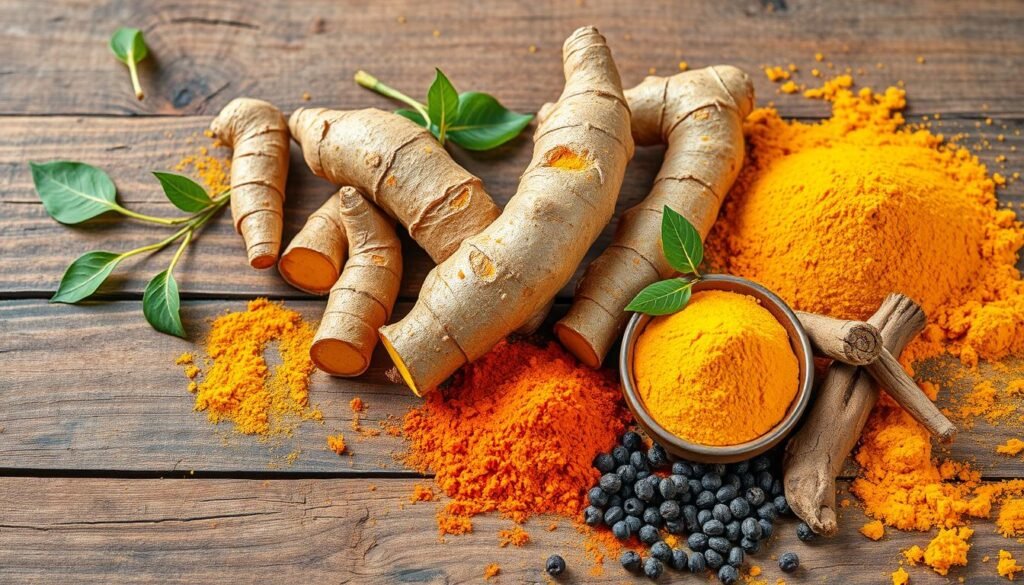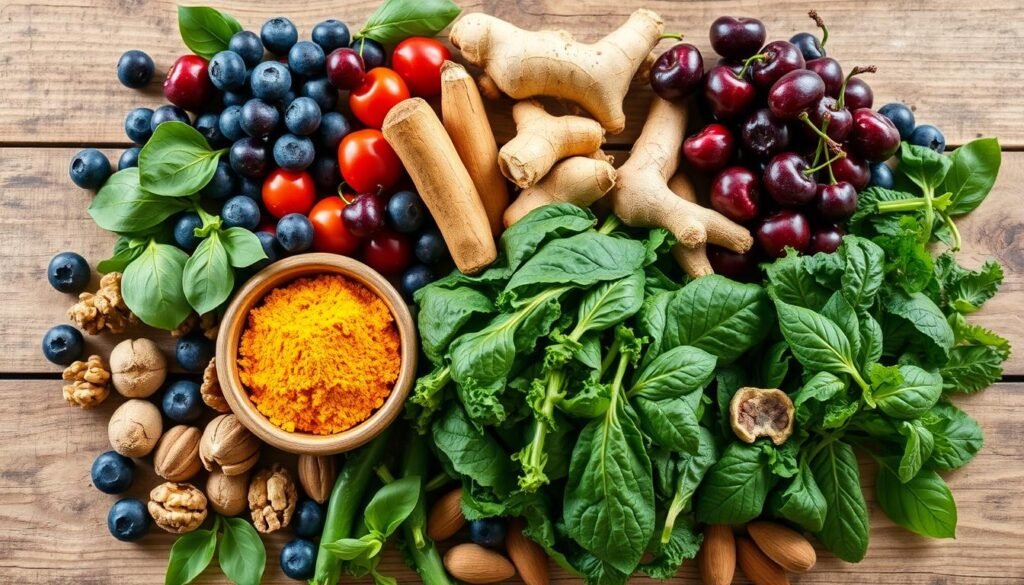Have you ever felt like your body was fighting an invisible battle? Inflammation might be that silent enemy lurking beneath the surface, impacting your wellness in ways you never imagined. As someone who struggled with chronic inflammation, I discovered the power of nutrition in transforming my health through an anti-inflammatory diet.
Your dietary choices can be a powerful weapon against chronic inflammation. By selecting the right superfoods, you can naturally support your body’s healing processes and reduce inflammation markers. This journey isn’t about strict restrictions but making smart, informed nutrition tips that boost your overall health benefits.
The foods you eat play a critical role in managing inflammation reduction. From vibrant berries to nutrient-dense fish, nature provides an arsenal of ingredients that can help combat inflammatory responses and support your body’s natural defense mechanisms.
Key Takeaways
- Inflammation can be managed through strategic dietary choices
- Whole foods are essential for reducing chronic inflammation
- Anti-inflammatory diet supports overall wellness
- Some foods have powerful natural anti-inflammatory properties
- Nutrition plays a critical role in managing inflammatory responses
Understanding Inflammation and Its Impact on Health
Inflammation is a complex response in your body. It’s key to your immune support and defense. Not all inflammation is bad. It helps fight infections and heal injuries.
Acute vs. Chronic Inflammation
Knowing the difference between acute and chronic inflammation is important. Acute inflammation is a short-term response to threats:
- Occurs quickly after injury or infection
- Typically resolves within days or weeks
- Signals the immune system to heal and protect
Chronic inflammation, in contrast, lasts for months or years. It can lead to serious health problems.
How Diet Affects Inflammation
Your diet greatly affects inflammation. Some foods cause inflammation, while others reduce it:
| Inflammatory Foods | Anti-Inflammatory Foods |
|---|---|
| Refined sugars | Leafy green vegetables |
| Processed meats | Fatty fish |
| Trans fats | Berries |
Signs of Chronic Inflammation
Spotting chronic inflammation early is key. Look out for these signs:
- Persistent fatigue
- Unexplained body pain
- Digestive issues
- Frequent infections
“Your diet is a powerful tool in managing inflammation and promoting overall health.” – Nutrition Experts
Understanding inflammation’s role in your body helps you make better choices. These choices support long-term health and reduce disease risk.
Berries: Nature’s Antioxidant Powerhouse
Explore the amazing world of berries. These small fruits are full of nutrients and antioxidants. They can boost your immune system and overall health.
Types of Anti-inflammatory Berries
Each berry has its own health benefits. Here are some of the most powerful ones:
- Blueberries: Highest antioxidant activity among commonly consumed fruits
- Blackberries: Rich in vitamin C and manganese
- Raspberries: Excellent source of fiber and ellagic acid
- Strawberries: Low in calories, high in vitamin C
Benefits of Anthocyanins
Anthocyanins are antioxidants that make berries colorful. Studies show they can:
- Reduce inflammation markers
- Protect against DNA damage
- Support heart health
- Potentially lower cancer risk
| Berry Type | Calories (100g) | Fiber (g) | Key Nutrients |
|---|---|---|---|
| Blackberries | 43 | 5.3 | Vitamin C, Manganese |
| Raspberries | 53 | 6.5 | Fiber, Ellagic Acid |
| Strawberries | 32 | 2.0 | Vitamin C, Antioxidants |
| Blueberries | 57 | 2.4 | Anthocyanins, Vitamin K |
Best Ways to Incorporate Berries
Make berries a tasty part of your daily meals. Here are some easy ways:
- Add to morning smoothies
- Sprinkle on yogurt or oatmeal
- Enjoy as a fresh snack
- Use in salads or desserts
“Berries are not just food, they’re a natural medicine cabinet in a small, delicious package.” – Nutrition Expert
Whether you eat them fresh or frozen, berries are great for your health. Aim for a variety of colors to maximize your antioxidant intake. Just remember to eat them in moderation, if you’re on a diet.
Fatty Fish and Omega-3 Benefits
Discover the powerful anti-inflammatory effects of fatty fish rich in omega-3 fatty acids. Adding these to your diet can greatly improve your heart health.
Certain fatty fish are nutritional champions for fighting inflammation and boosting wellness. The American Heart Association suggests eating fish twice a week for the best health benefits.
“Food is the most powerful medicine when chosen wisely” – Nutritional Science Insight
Top Omega-3 Rich Fatty Fish Sources
- Salmon: 2,150 mg EPA and DHA per 3.5 oz serving
- Mackerel: 4,580 mg EPA and DHA per 3.5 oz serving
- Herring: 2,150 mg EPA and DHA per 3.5 oz serving
- Sardines: 1,463 mg EPA and DHA per cup
- Anchovies: 411 mg EPA and DHA per 5 anchovies
Your body turns these omega-3 fatty acids into anti-inflammatory compounds. These compounds fight chronic inflammation. They may lower the risk of metabolic syndrome, heart disease, and diabetes.
| Fish Type | EPA and DHA (mg per serving) | Health Benefits |
|---|---|---|
| Salmon | 2,150 | Heart health, reduces inflammation |
| Mackerel | 4,580 | High omega-3 content, supports immune function |
| Sardines | 1,463 | Compact nutrition, low mercury |
Healthy adults should aim for 250-500 mg of EPA and DHA daily. By adding fatty fish to your diet, you can boost your nutrition and support your health for the long term.
Mediterranean Diet: A Model for Anti-Inflammatory Eating
Learn about the Mediterranean diet, a diet that’s caught the eye of health experts everywhere. It’s more than a diet; it’s a way of life that boosts health and fights inflammation.

People in Mediterranean areas tend to have fewer chronic diseases than those on a typical American diet. This diet is a path to wellness that goes beyond just eating right.
Mediterranean Diet Connection
The Mediterranean diet is a top choice for healthy eating. It’s known for:
- Focus on plant-based whole foods
- Includes seafood and poultry in moderation
- Limits red meat
- Uses olive oil as the main fat
Building a Balanced Anti-inflammatory Meal Plan
Creating a good meal plan means making smart food choices. The American Heart Association says this diet helps prevent heart disease and manage inflammation.
| Food Group | Recommended Daily Intake |
|---|---|
| Fruits and Vegetables | 5-7 servings |
| Whole Grains | 3-4 servings |
| Seafood | 2-3 servings per week |
| Nuts and Seeds | 1-2 servings |
Shopping Guidelines for Anti-inflammatory Foods
When you’re shopping for a Mediterranean diet, keep these tips in mind:
- Go for fresh, unprocessed whole foods
- Pick colorful produce
- Choose wild-caught fish
- Use extra virgin olive oil
- Add herbs and spices for flavor
“The Mediterranean diet is not a temporary fix, but a sustainable approach to wellness.” – Nutrition Experts
By following these guidelines, you can change your eating habits. This might help lower inflammation, improve heart health, and boost overall wellness.
Olive Oil and Heart-Healthy Fats
Explore the amazing world of healthy fats with extra virgin olive oil (EVOO). This liquid gold is more than just a cooking ingredient. It’s a heart-health superhero with incredible benefits for your body.
The science behind olive oil’s benefits is truly fascinating. It’s full of monounsaturated fats and antioxidants. These fight inflammation and protect your heart. Registered dietitian Julia Zumpano suggests eating 1 to 4 tablespoons a day, based on your health.
“Olive oil is not just food, it’s medicine you can eat daily.” – Traditional Mediterranean saying
Key Nutritional Highlights of Olive Oil
- Contains over 20 types of polyphenols that reduce inflammation
- Oleic acid makes up 73% of the oil’s composition
- Linked to lowering bad cholesterol and reducing heart disease risk
- Provides 13% of daily Vitamin E and 7% of daily Vitamin K
Scientific research reveals remarkable benefits. Eating a lot of olive oil can lower disease risk by 8% to 34%. People who ate a lot were 19% less likely to die from heart disease and 17% less likely to die from cancer.
Practical Consumption Tips
- Choose extra virgin olive oil for maximum health benefits
- Use as a salad dressing or cooking oil
- Aim for 1/2 tablespoon daily to support heart health
- Store in a cool, dark place to preserve nutrients
Adding olive oil to your diet is more than just flavor. It’s a powerful nutritional choice for long-term wellness.
Turmeric and Other Powerful Spices
Unlock the healing power of your spice rack with turmeric. This golden-hued spice has been a natural remedy for centuries. Modern science has found its amazing anti-inflammatory effects.

Curcumin’s Remarkable Anti-inflammatory Power
Curcumin, turmeric’s main compound, fights inflammation well. Studies show it can help with many health issues by reducing inflammation. Some benefits include:
- Potential protection against cell damage from free radicals
- Support for joint health and reduced arthritis pain
- Possible benefits for inflammatory conditions
The Black Pepper Connection
Here’s a game-changing tip: mixing turmeric with black pepper boosts curcumin absorption. Studies show this combo can increase bioavailability by 2,000%. This makes your supplements much more effective.
“Nature’s most powerful remedies often work best in combination” – Nutrition Experts
Smart Consumption Guidelines
When using turmeric as a supplement, remember these tips:
- Choose whole foods over concentrated supplements
- Always talk to a healthcare professional before starting a new supplement
- Be careful of possible interactions with medications
Turmeric supplements can be helpful but may cause side effects in high doses. Use them in moderation. Focus on adding this anti-inflammatory spice to your meals through cooking and natural recipes.
Green Tea’s Anti-inflammatory Properties
Green tea is a drink full of health benefits. It’s rich in antioxidants, helping you stay well naturally. A special compound called EGCG gives it strong anti-inflammatory powers.
Studies show green tea can greatly improve your health:
- 64% lower chance of cognitive impairment in middle-aged adults
- Potential to reduce heart disease risk factors
- Possible cancer prevention properties
- Enhanced metabolic rate when combined with exercise
The antioxidants in green tea fight inflammation in your body. Drinking four or more cups a day may help:
- Lower blood pressure
- Reduce stroke risk
- Support heart health
- Potentially decrease abdominal fat
“Green tea is not just a drink, it’s a natural shield for your body’s wellness” – Modern Nutrition Research
To get the most benefits, brew green tea at 160-180°F for 1-3 minutes. Most adults can safely drink up to eight cups a day. This amount includes 338 milligrams of catechin and EGCG, which is safe.
| Green Tea Benefit | Potential Impact |
|---|---|
| Heart Health | Reduced risk factors |
| Cancer Prevention | Lowered development risk |
| Cognitive Function | 64% lower impairment chance |
| Metabolic Support | Increased fat burning |
Remember, green tea is a supplement to a balanced diet, not a miracle cure. Consult healthcare professionals for personalized advice.
Nuts and Seeds for Inflammation Control
Discovering the power of nuts and seeds can change how you fight inflammation. These small foods are full of healthy fats, plant-based proteins, and omega-3s. They help reduce inflammation naturally.
Best Anti-inflammatory Nuts to Choose
Not all nuts are the same in fighting inflammation. Here are some top choices:
- Walnuts: Excellent for brain health and reducing inflammation
- Almonds: Helps lower cholesterol and inflammatory markers
- Brazil nuts: Rich in selenium with powerful antioxidant properties
- Pistachios: Boosts antioxidant levels and supports heart health
Optimal Portion Sizes for Maximum Benefits
To get the most from nuts and seeds, portion control is important. Experts suggest:
| Nut/Seed | Daily Recommended Portion | Key Benefits |
|---|---|---|
| Walnuts | 1-2 ounces | Brain function support |
| Almonds | 2 ounces | Reduces inflammatory markers |
| Pistachios | 1.5 ounces | Lowers blood pressure |
“One-fourth of a cup is the ideal portion size for maximizing nutritional benefits without excessive calories.”
Smart Storage Tips for Preserving Nutritional Value
Keep your nuts and seeds fresh with these storage tips:
- Store in airtight containers
- Keep in cool, dark places
- Refrigerate or freeze for extended freshness
- Choose ground flaxseeds for better nutrient absorption
Pro tip: Ground flaxseeds are more easily absorbed by the body compared to whole seeds, making them a more effective anti-inflammatory food.
Dark Leafy Greens and Cruciferous Vegetables
Discover the amazing health benefits of leafy greens and cruciferous vegetables. They are your allies in the fight against inflammation. These foods are full of antioxidants that can change your health for the better.
Dark leafy greens like kale, spinach, and collard greens are nutritional powerhouses. Just one cup of raw kale gives you:
- 68% of Daily Value for vitamin K
- 6% of Daily Value for vitamin A
- 22% of Daily Value for vitamin C
Cruciferous vegetables, such as broccoli and Brussels sprouts, offer more anti-inflammatory benefits. Sulforaphane, found in these veggies, lowers inflammatory markers in your body.
“Eating a variety of leafy greens can significantly boost your body’s natural defense mechanisms against chronic inflammation.”
To stay healthy, aim for:
- 3 cups of dark leafy greens per week
- Daily intake of cruciferous vegetables
- Try different types for the best nutrition
Your body will be grateful for these fiber-rich foods. They’re not just veggies; they’re your nutritional allies in the battle against inflammation and for better health.
Conclusion: Creating a Sustainable Anti-inflammatory Lifestyle
Changing your diet to fight inflammation needs careful planning and dedication. Start by learning how certain foods can help. An anti-inflammatory diet is not just about avoiding bad foods. It’s also about adding foods that help your body heal.
Choosing whole foods is key to healthy eating. Foods like lean proteins, omega-3 fish, and berries are full of nutrients. They help lower inflammation. Tips for healthy eating include eating more plants and avoiding processed foods.
But healthy living is more than just food. It also means staying active, managing stress, and getting enough sleep. Seeing your diet as part of a bigger wellness plan is important. This way, you can fight inflammation and lower disease risks.
Everyone reacts differently to food changes. Talking to a healthcare expert can help create a diet plan that’s right for you. By focusing on an anti-inflammatory lifestyle, you’re taking a big step towards better health.




